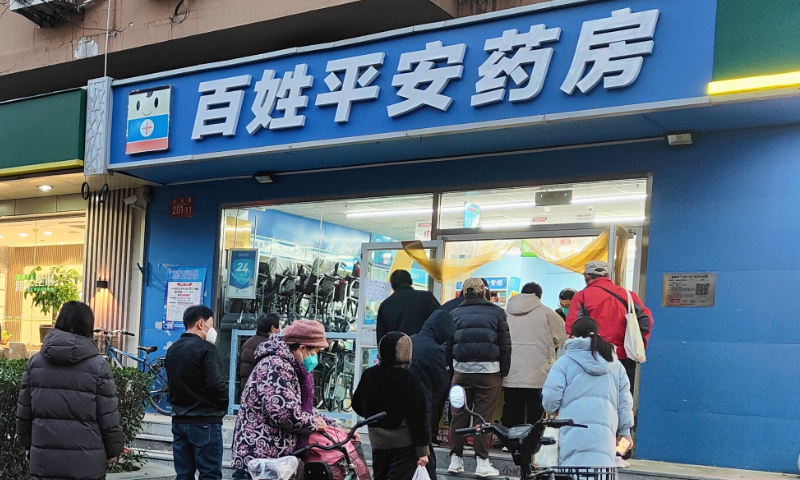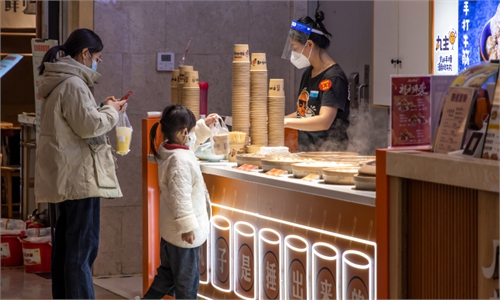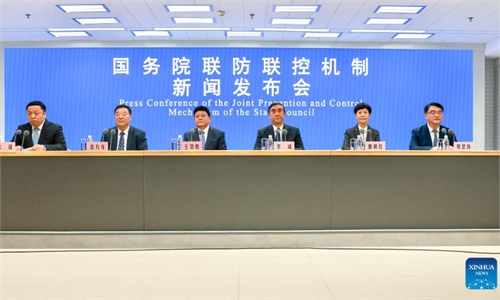‘Be positive, be patient,’ Chinese people show cooperation, solidarity in weathering COVID exit wave

People line at a drug store in Beijing on December 8, 2022. Photo: VCG
"Be positive, be patient” has recently became a trending phrase on the Chinese internet as the number of people testing “positive" for COVID-19 is surging and more “patients” feel malaise with flu-like symptoms.
The term, however, is also used by netizens to reflect their “patience” and “optimism” that China will weather the COVID-19 exit wave, as most people with mild symptoms chose to recover at home as suggested by the government to conserve valuable medical resources for vulnerable groups.
Chinese Vice Premier Sun Chunlan visited Beijing’s front-line medical and community workers on Tuesday, and examined hospitals' preparedness for fighting COVID-19. She stressed that it is important to shift focus from preventing infection to medical treatment of patients.
Sun said the central government attached great importance to Beijing’s epidemic situation, and the most urgent task is to guarantee the public’s need for medicines. She said the Beijing government is putting its weight into solving the problem.
Officials from the capital Beijing said at a Monday conference that after the release of 10 new measures of COVID-19 response, the capital's second-class hospitals reported 19,000 patients with flu-like symptoms last week, 6.2 times higher than during the previous week. Other metropolises such as Shanghai and Guangzhou reported no sudden surge of patients at fever clinics but they have either expanded such clinics around the city or opened online consultation service for patients with fever symptoms.
Posts laying out the symptoms of the Omicron variant are and what medicines to take, and experiences of a quick recovery flooded social media platforms.
Mavis Zhang, a Beijing resident recorded her experience in battling Omicron on Little Red Book, the Chinese equivalent of Instagram. Her posts which described in detail the different stages of infection, what medicines to take and measures that speed up recovery, have garnered thousands of likes on that platform.
"I shared my experience just to tell others: see, Omicron is not that terrible, and that those who have mild symptoms can just rest at home for recovery," she told the Global Times.
Medical resources are strained in Beijing, and the city has issued guidance for residents to recover at home, advised patients with mild or no symptoms not to call emergency services, and urged them not to stockpile medicines as medical supplies in the city are under great pressure. Pharmacies are running out of over-the-counter remedies to treat flu-like symptoms.
Will Hu, a Beijing resident, said some in his company had tested positive last week. Several of his colleagues were struggling to get medicines, but that those who recovered fast offered their medicines to those who are still sick. “We joked that it is like those who recovered first can help others who recover later,” Hu said
Almost 99.5 percent of those infected with Omicron have no need to go to hospital, they can consult doctors on phones or online to get better, Zhang Wenhong, head of the infectious disease department at Huashan Hospital in Shanghai, also director of the National Center for Infectious Diseases, was quoted by media as saying last week. But Zhang stressed that the medical system must guarantee the remaining 0.5 percent get timely treatment.
Zhang warned that medical workers should be prepared to be infected during this time, but also try to avoid being infected simultaneously, in case the medical system is overwhelmed.
Now there is an urgent need for medical staff, and ensuring there are enough personnel to staff the medical system is the most crucial problem, Zeng Guang, a former chief epidemiologist from the Chinese Center for Disease Control and Prevention, told the Global Times. He noted that some hospitals in Beijing are asking retired medical employees to come back.
Zeng suggested that medical workers with mild and no symptoms can be deployed to work. Currently, if medical workers who are infected are absent, there will be a greater problem as patients will not be admitted, he said, warning that infected doctors and nurses should not work in wards with seniors or patients with chronic diseases.
At a conference on Tuesday, Mi Feng, a spokesperson from the China's National Health Commission said that elderly, pregnant women, children and people with chronic underlying diseases are the key groups of our medical system currently. He also said the government has rolled out plans to guarantee the working conditions for medical workers, will arrange their work in a rational manner and make sure their health is monitored.
Hu has not been infected with Omicron. But he said he will recover at home if he does test positive, so that he will not cause trouble for the country “as the Chinese government has taken care of us for the past three years. Now it is time for us to move forward on our own, shoulder primary responsibility for our health and leave the medical resources to those in need.”
On China’s Twitter-like Sina Weibo, many Chinese netizens joked that the fortune cookie phrase “be positive, be patient” means “tested positive for coronavirus and become a COVID-19 patient” amid the surge in cases. But more believed that the phrase can also be China’s response to the first exit wave, “let’s help each other, and be confident that the output will be positive.”


